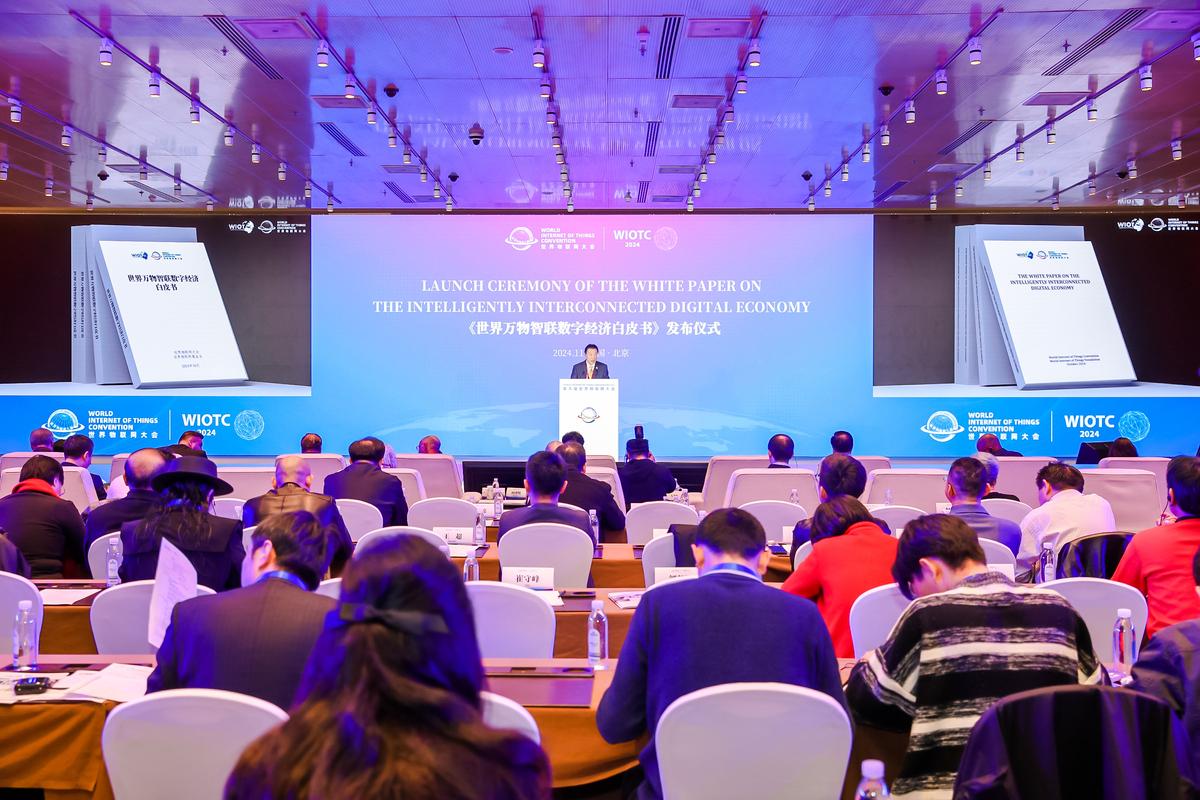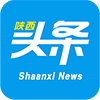WIOTC 2024 focuses on interconnected digital future
来源:China.org.cn 2024-11-05 17:01

The launch ceremony of the White Paper on the Intelligently Interconnected Digital Economy is held in Beijing, Nov. 3, 2024. [Photo courtesy of WIOTC]
The ninth annual World Internet of Things Convention (WIOTC 2024) commenced on Nov. 3, in Beijing, bringing together leaders of government agencies, enterprises, industrial associations and standards organizations worldwide to discuss the future of the Internet of Things (IoT) under the theme, "Towards a New Future for Digital Economy: An Intelligently Interconnected New World."
The aim of the event was to support the U.N. sustainable development agenda, bridge the global digital divide, create an international model of an intelligently interconnected digital economy in China, and explore new pathways for digital economic collaboration.
In his message to the convention, U.N. Secretary-General Antonio Guterres addressed the transformative impact of digital technology on business and economic growth. He emphasized that "real-time data sharing, IoT applications, information networking, and artificial intelligence are empowering the development of smart grids, smart homes and smart cities."
However, he noted the digital divide, saying: "Not all countries or communities are benefiting equally. For those without capacity or connectivity, the digital divide is also an opportunity divide."
"Digital technology is about bridging divides," he added, calling for efforts to ensure evolving technologies benefit all people equally.
During the convention, speakers noted China's significant strides in IoT and digital economy innovation, underscoring the country's investments in digital infrastructure and supportive government initiatives that have positioned it as a global leader in these fields.
According to He Xuming, chairman of the WIOTC executive committee, the number of global IoT connections is expected to surpass 25 billion this year, with China playing a crucial role. The country's digital infrastructure is expanding significantly. It is on track to build over 4.3 million 5G base stations to support IoT this year and surpass 3 billion IoT connections, he said.
Yu Hongjun, former vice minister of the International Department of the Central Committee of the Communist Party of China (CPC), added that in recent years, China has actively promoted the innovation and development of the internet and digital economy. He said, "The establishment of foundational communication networks, the widespread application of 5G, and the development of 6G have laid a solid foundation for digital economic transformation and upgrading."
The country's strategic initiatives proposed during the 20th CPC National Congress, focusing on building a strong digital China and a smart society, were further reinforced by the third plenary session of the 20th CPC Central Committee. The resolution emphasized "improving the commodity distribution system, and speeding up the development of the Internet of Things."
"China's leadership in advancing digital innovation and IoT continues to serve as a powerful model, inspiring nations worldwide to embrace the possibilities of digital technologies," said Sinisa Berjan, ambassador of the Embassy of Bosnia and Herzegovina to China.
The ambassador also stressed the shared responsibility to ensure that the advantages of digital transformation are distributed equally, calling for a world where technology can support an inclusive digital landscape that benefits all.
Berjan called IoT a "critical driver of digital development," explaining it has the potential to revolutionize key sectors like health care, agriculture, energy and transportation. "IoT enhances productivity, optimizes resource use and empowers communities, ensuring that economic progress aligns with environmental stewardship," he added.
However, Berjan stressed the need for strong international cooperation to fully unlock these benefits. He called for the sharing of best practices, the development of unified standards, and mutual support among countries to help every nation tap into the potential of IoT.
Platforms like the WIOTC provide invaluable opportunities for such exchanges, fostering a spirit of collaboration that fuels progress, innovation and economic development, he said, adding that "together, we can lay the foundation for a future where the benefits of digital transformation reach every community and individual."
Leaders from major standardization bodies also underscored the importance of collaboration. Jo Cops, president of the International Electrotechnical Commission (IEC), emphasized that, given the current environmental challenges, "IoT supports the energy transition and the deployment of renewables through smart grid applications." He added, "To meet our common challenges and goals, we need to collaborate."
Similarly, Sung Hwan Cho, president of the International Organization for Standardization (ISO), advocated for an inclusive digital future, saying, "It is crucial that this progress actually supports the U.N. Sustainable Development Goals and bridges the digital divide."
At the convention, the WIOTC released the White Paper on the Intelligently Interconnected Digital Economy. Zhang Hua, vice chairman of the WIOTC executive committee, explained that the white paper outlines the innovative development direction and theoretical foundation of the global IoT digital economy, including concepts, advanced digital economy models, global market structures, and sustainable development pathways.
The white paper provides expert guidance for global governments on internet development and digital economy upgrades, and serves as a reference for enterprises aiming to transform and enhance their data applications, Zhang said.





